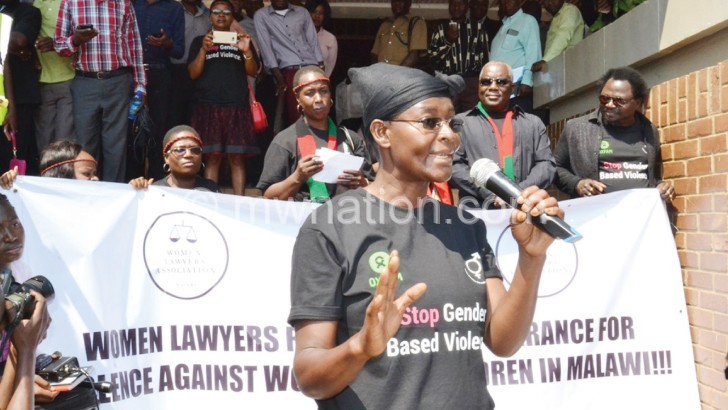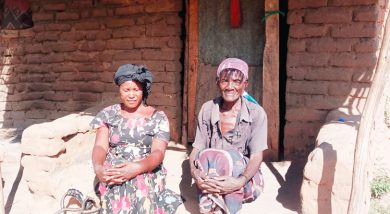Speak out to end gender abuse
The woman, we have christened Mercy Mkonda to conceal her identity for fear of a violent backlash from her husband, regrets marrying him.
Once, the 37-year-old lived happily with her husband, but she reckons there have been fewer smiles than sorrows lately.
“The only time we share jokes is when he seeks conjugal rights. Otherwise, every time he faults, insults and beats me up for no apparent reason. He usually threatens that I will lose my life if I report the beatings to anyone,” she says.
The mother-of-two, from Manje slum in Blantyre, married in 2007.

She narrates: “The joyful life ended January. Everything in our marriage turned upside down when my husband lost his job as a shopkeeper in Limbe.
“When he was sacked, he started taking a lot of alcohol and behaving strangely. At times, he spent nights at drinking joints not far from home.”
Fast forward to August 7, a sunny Monday in the populous settlement. Around 8pm, the woman nearly lost her life at the hands of her husband who reportedly beat her with a metal rod.
“That day, he gave me K200 to buy vegetables. When he returned from his drinking escapades around 6pm, he found nothing on the table and he dressed me down publicly. He later poured on me boiling water meant for preparing nsima and hit me heavily with the iron bar. He chased me out of the house,” she recounts.
Pandemic problem
Mercy fears more terror could have followed had her children not cried for help.
Her neighbours have been asking her to report these acts of domestic violence to police, but she feels doing so will put her marriage and life in danger.
Violence against women constitutes a violation of human rights.
According to the United Nations (UN) Declaration on the Elimination of Violence against Women, the phenomenon, often sanitised as a family affair, is a manifestation of historically unequal power relations between men and women.
In 2006, the then UN Secretary General Kofi Annan said gender-based violence (GBV) had become “a problem of pandemic proportions”.
According to the global body, one in every three women worldwide has been beaten, coerced into sex or abused in their life-time.
The perpetrator is usually an intimate partner or someone they know.
Last year, Malawi Police Service (MPS) disclosed that almost l0 745 cases of GBV and domestic violence had been reported in the country’s police posts in just six months—from January to June.
National police spokesperson James Kadadzera says the number of cases involving emotional violence was slightly over 7 200 and half of them happened in the Southern Region.
Government has ratified numerous international agreements to end GBV, including the African Union’s Convention on Elimination of All Forms of Discrimination against Women (Cedaw).
The treaties oblige government to show commitment towards safeguarding women from violent acts.
Ministry of Gender, Children, Disability and Social Welfare spokesperson Lucy Bandazi says government is collaborating with traditional leaders, faith-based organisations, the civil society and other stakeholders to prevent, reduce and eliminate GBV.
However, gender activists say efforts to combat gender crimes are usually slow and scanty.
The country waited until Dowa-based man, Herbert Mankhwala, chopped the hands of his wife Marietta Samuel, to dust off and pass the Prevention of Domestic Violence Act in 2006.
After the law was enacted, the country soon discovered that it had some operational challenges which prevented effective implementation. It is currently under review.
In 2013, Parliament passed the Gender Equality Act which further outlaws GBV in and outside homes.
Since 1991, the annual l6 Days of Activism offer everyone a time to reflect on the gains achieved, raise awareness and redouble efforts to eliminate abuse of women’s rights.
This year’s theme—Leave No One Behind: End Violence against Women and Children—calls for greater strides to create a safer world for all.
Violence-free world
NGO-Gender Coordination Network chairperson Emma Kaliya says although the country seems to be making progress, gender-related violence continues to occur at an increasing rate.
“Such incidences offer a clear indication that there is need for increased awareness and reporting to sustain the campaign until we achieve a violence-free Malawian society,” she says.
Mercy’s scenario is just one known case, but many go unreported due to an entrenched culture of silence and women’s dependence on men. n





